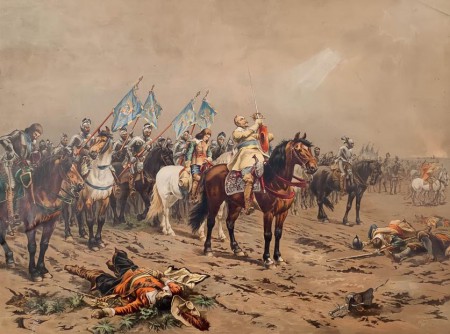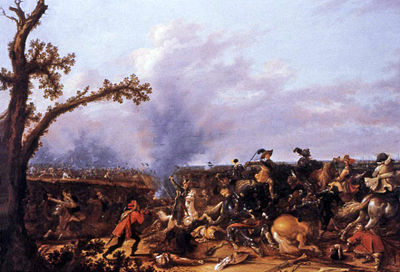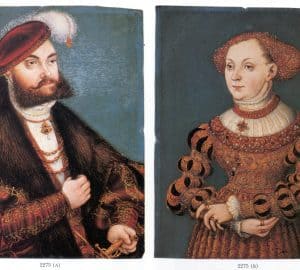Two months after the siege of Nuremberg, the armies met again around Lützen, on a plain intersected by ditches and canals. Wallenstein had not expected the Swedes to attack that late in the season. He deployed his men and sent a message to Pappenheim to bring up more Imperial troops. Gustavus had about 12,800 infantry, 6,200 cavalry and 60 cannon. Wallenstein had 10,000 infantry, 7,000 cavalry and 24 guns, Pappenheim 3,000 infantry and 2,000 cavalry.

The Swedes were awake two hours before dawn on November 16, the day of battle. Prayers were read and hymns were sung. The king appeared, mounted on his white charger and, as usual, without armor. Riding before his lines, with his sword drawn, he said to the men,
There you have the enemy in front of you. He is not on a mountain or behind entrenchments this time, but on the open plain. You know well how eagerly he has sought to avoid fighting, and that he is only fighting now because he cannot escape us. Fight them, my dear countrymen and friends, for God, your country, and your King. I will reward you all, and bravely: but if you flinch from the fight, you know well that not a man of you will ever see Sweden again. Forward in God’s name; Jesu! Jesu! Jesu! help us to strive today to the honour of thy Holy Name.
When the morning mist had lifted, the Swedish army advanced. After an hour long artillery barrage, they charged. The fighting was desperate and the lines were often disorganized by the ditches in the field. At length the Protestant right, commanded by Gustavus himself, was able to outflank Wallenstein’s left and drive it into retreat. The success spread to the center, where the Swedes captured the enemy’s battery.

But at this critical moment Pappenheim arrived, leading his cavalry, and charged into the fray. He stayed the Swedish advance, but was himself wounded by a cannonball. He died while being carried from the field. Seeing the battle begin to turn, Gustavus Adolphus found a regiment of cavalry and led them forward. As they galloped across the field, the king pulled ahead of his men. Riding through the smoke field, he suddenly encountered a group of Imperial cavalry. They unleashed a volley from their pistols, striking the king in the army. Duke Francis Albert rode up, and Gustavus said to him, “Cousin, help me out of the battle, for I am sore hurt.” As his attendants tried to remove him, he was hit by several more bullets. German horsemen soon discovered the wounded king and page, and they stabbed him many times with their swords.

Rumors of their commander’s death soon spread along the lines, and some men saw his bloodstained horse galloping back and forth in a frenzy. The subordinate Protestant commanders did not falter at this reverse. “Retreat!” cried Duke Bernard, “the time for that is past. It is vengeance now!” They made a desperate charge, but it was driven back by the Catholics, who made a heavy counter attack. The Swedish line began to retreat, but some regiments stood firm at a terrible cost. Two of the best Swedish regiments, the Blue and Yellow, were nearly wiped out. Nonetheless, the line held. Hard and bloody fighting continued throughout the day. When the sun set, the Protestants held the Imperial battery, and the Catholics retreated. Pappenheim’s infantry then arrived on the field, but Wallenstein would not allow them to attack. He fell back, acknowledging his defeat.
The Swedes had won the battle, but it had come at a heavy cost. Both sides lost around 6,000 men. The most important of these by far was King Gustavus Adolphus. The Protestants had lost their greatest commander, and the firm hand that was needed to keep some unity among the German princes. The war continued for many years, at heavy cost to Germany.

Thus died Gustavus Adolphus, king of Sweden, leading a charge as he had done so often. He was mourned all over Europe as the great hero of the Protestants. Although much is recorded about him, many questions remain unanswered.
We do not know much about Gustavus personal life. He had an illegitimate son in 1616, but we know little about the king’s character or its development. His innermost motives are nearly impossible to discern, but he did write, “God grant me so to live, that I may ever live with Christ, and on earth may never blush for my own deeds.”
It is also difficult to reach a conclusion about what his aim was in the invasion of Europe. Was it to save Protestantism, as the pamphlets of the day said? Was it to protect Sweden? Was it to establish a Scandinavian empire? Was it to gain power for himself? Doubtless some combination of the above.

Regardless, we can say with certainty that he was a brilliant tactician, a great general, and a hero who did much for the cause of Protestantism. We will close with a letter from Gustavus Adolphus to his friend and minister Axel Oxenstiern which serves as a good summary of his life:
The issue of battle is doubtful by reason of our sins, doubtful too is human life’s span. I beg you, therefore, if it go hard with us, not to loose heart, but to look to my memory and the welfare of those dear to me. Deal with me and mine as I would with you and yours. I have reigned for twenty years with grievous toil, but, God be praised, with honour too. I have honoured my Father-land, and made light of life, riches, and good days for its sake. I have had no other end in life but to do my duty in my station. But, if I fall, my dear ones will be in a pitiable state; they are women, – the mother none too wise, the daughter a tiny maiden; too weak if they receive advice. It is στοργη naturalis [natural love] that drives me to write thus to you, and it is a relief to write. Yet them, and my body, and my soul, and all God hath given me, I do commend to His Holy Keeping.

Sources
The Thirty Years War by C. V. Wedgwood
Gustavus Adolphus and the Struggle of Protestantism for Existence by C. R. L. Fletcher




